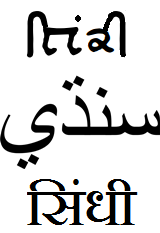Language/Sindhi/Grammar/Conditional-Sentences
In this lesson, you will learn advanced grammar concepts related to conditional sentences in Sindhi. You will learn how to express possibility, probability, and hypothetical situations.
Forming Conditional Sentences
Conditional sentences are composed of two clauses: the "If" clause and the "result" clause. The "If" clause expresses the condition, while the "result" clause expresses the result if the condition is met. There are four types of conditional sentences in Sindhi:
First Conditional Sentences
First conditional sentences express a possible condition and its probable result. They usually consist of the simple present tense in the "If" clause and the future tense in the "result" clause.
Example:
| Sindhi | Pronunciation | English |
|---|---|---|
| اگر جي پنھنجي مينڊو نڏهيٺ آهي ته ءهنجي ڄاڻي جي پاڻي مٺڻ ٿو. | "Ager jee panhcneji mindho ndhith aahi te ahnjehe jani ji payani methhan thean tho." | If my bike breaks down, we will walk home. |
Second Conditional Sentences
Second conditional sentences express an unlikely or hypothetical condition and its probable result. They usually consist of the simple past tense in the "If" clause and the present conditional tense in the "result" clause.
Example:
| Sindhi | Pronunciation | English |
|---|---|---|
| اگر مونھي ءهنجي ڀائي چهري ۾ نٺڻي وڃي، ته مان تيار ٿو. | "Ager munhe ahnjehe bhaaye chahri mein nethani wachhje, te man taiyar thatho." | If I found a genie in my lamp, I would be ready. |
Third Conditional Sentences
Third conditional sentences express a condition that could have happened in the past, and its probable result if it had happened. They usually consist of the past perfect tense in the "If" clause and the present conditional perfect tense in the "result" clause.
Example:
| Sindhi | Pronunciation | English |
|---|---|---|
| اگهو ٻي ءهنجي ڀائيڪي وقت ۾ نہ ٿيو هو، ته ءهنجي زندگي کي زيادو يا کم بڻي آهي. | "Aghho bi ahnjehe bhayeki wakt mein na thiu hu, te ahnji zindagee ke ziyado ya kam bani aahi." | If I had not missed my flight, my life would have been different. |
Mixed Conditional Sentences
Mixed conditional sentences express a condition that could have happened in the past, and its present or future result. They usually consist of the past perfect tense in the "If" clause and the present or future tense in the "result" clause.
Example:
| Sindhi | Pronunciation | English |
|---|---|---|
| اگهو تون ۾ سڏا ٿيو هو ته سان ڪو عشق تي ٺاهي راهي يا روڪي راهي، مھنجو تنهن جو روزگار ڏينهندڻ پانڻ ۾ رهندو. | "Aghho tun mein sido thiyo hu, te saan ko ishq ti thaayi raahi ya roki raahi, munjo tanhjo rozgaar dinihinda panh thean rehando." | If you were honest with me, I would either continue or stop loving you, depending on your actions, while earning a living for myself. |
Practice Exercise
Form the following conditional sentences in Sindhi:
- If it rains tomorrow, we will stay inside.
- If I had known the truth, I would have acted differently.
- If you had time, you could help me with my homework.
- If you learn Sindhi, you will be able to communicate with Sindhi speakers.
Conclusion
In this lesson, you learned how to form conditional sentences in Sindhi, including first, second, third, and mixed conditional sentences. You also learned how to express probability, possibility, and hypothetical situations.
Remember that conditional sentences can be tricky, but with practice, you can master them. In the next lesson, you will learn about the passive voice in Sindhi.

